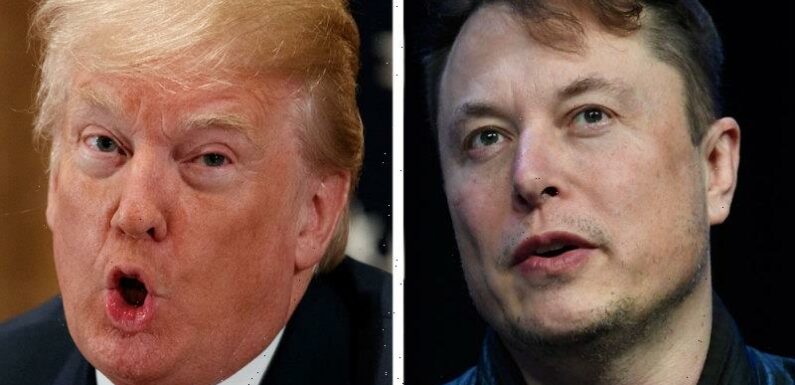
Washington: Donald Trump has vowed to “dismantle” online censorship if he becomes president again, unveiling an election policy that would target federal agencies for suppressing free speech and force social media giants to warn users if they have their accounts removed or restricted.
As Twitter boss Elon Musk came under fire for suspending the accounts of journalists that have written critical stories about him, along with an account that tracked the movements of Musk’s private jet, Trump spruiked an election policy that could effectively challenge such decisions in future.
Elon Musk and Donald Trump.Credit:Bloomberg, AP
“When users of big online platforms have their content or accounts removed, throttled, shadow-banned, or otherwise restricted no matter what name they use, they should have the right to be informed that it’s happening, the right to a specific explanation of the reason why, and the right to a timely appeal,” the policy says.
“In addition, all users over the age of 18 should have the right to opt-out of content moderation and curation entirely, and receive an unmanipulated stream of information if they so choose.”
The five-part policy pitch is a rarity for Trump, who formally announced his candidacy for presidential nomination last month, despite being largely blamed for the Republicans’ poor showing at the midterm elections.
Since then, much of the former president’s campaign has involved spamming would-be donors for funds, attending controversial dinners with high-profile anti-Semites, and selling merchandise, such as the widely mocked digital trading cards he released this week, with his head atop cartoon superhero figures.
The “Donald Trump Digital Trading Card collection” can be collected like baseball cards and stored digitally for $US99 ($AUD147) each, and people who buy them are eligible for prizes such as a golf outing with the former president.
Viewed as cringeworthy – even by former advisers such as Steve Bannon – the cards nonetheless sold out in one day and netted almost $US4.5 million, despite the current slump in non-fungible tokens (NFTs) and cryptocurrency.
Trump’s free speech election policy outlined a bold plan to tackle what he characterises as the suppression of free speech if he is elected president in 2024.
First, he vowed that “within hours of my inauguration” he would sign an executive order banning federal agencies from censorship, and also restrict federal funds from “being used to label domestic speech as ‘mis-’ or ’dis-information”.
Former President Donald Trump in November as he announced he is running for president Credit:AP
He also pledged to “begin the process of identifying and firing every federal bureaucrat who has engaged in domestic censorship – directly or indirectly” – and said he would “ask Congress to send a bill to my desk revising Section 230, which generally provides content immunity to social media, “to get big online platforms out of censorship business.”
“The fight for Free Speech is a matter of victory or death for America – and for the survival of Western Civilisation itself,” he said. “When I am President, this whole rotten system of censorship and information control will be ripped out of the system at large.”
Musk, meanwhile, faced a backlash on Friday (local time) from lawmakers, commentators and officials on all sides of politics for suspending the account of at least eight journalists on Thursday without warning.
Vera Jourova, a vice president of the European Commission, said the move violated the European Union’s Digital Services Act, which takes effect next year, imposing a penalty of 6 per cent of global revenue for companies that breach its rules.
Musk “should be aware of that,” she Tweeted. “There are red lines. And sanctions, soon.”
Musk defended his actions, saying he removed the journalists because they had shared his live location on Twitter (an act known as “doxxing”) and also said that a car carrying one of his children was accosted by a “crazy stalker.”
“Criticising me all day long is totally fine, but doxxing my real-time location and endangering my family is not,” he tweeted.
The journalists, however, including reporters from The New York Times, The Washington Post and CNN, said they had simply reported that Musk had suspended the account of @elonjet – an account that gave the publicly available location of Musk’s jet.
While it is unclear how long the suspensions will last, the move was highly contentious in view of Musk’s claim before taking over Twitter that he was a “free speech absolutist.”
He has since allowed users back onto the platform, including those who had been suspended for violating previous Twitter policies on hate speech, COVID-19 vaccine misinformation or incitement.
Among them was Trump, whose account was reinstated on November 19 – almost two years after he was banned from the platform following last year’s January 6 attack on the US capitol building.
Trump, however, is yet to resume posting on Twitter, opting to stick, for now, with his social media platform Truth Social.
Get a note directly from our foreign correspondents on what’s making headlines around the world. Sign up for the weekly What in the World newsletter here.
Most Viewed in World
From our partners
Source: Read Full Article

